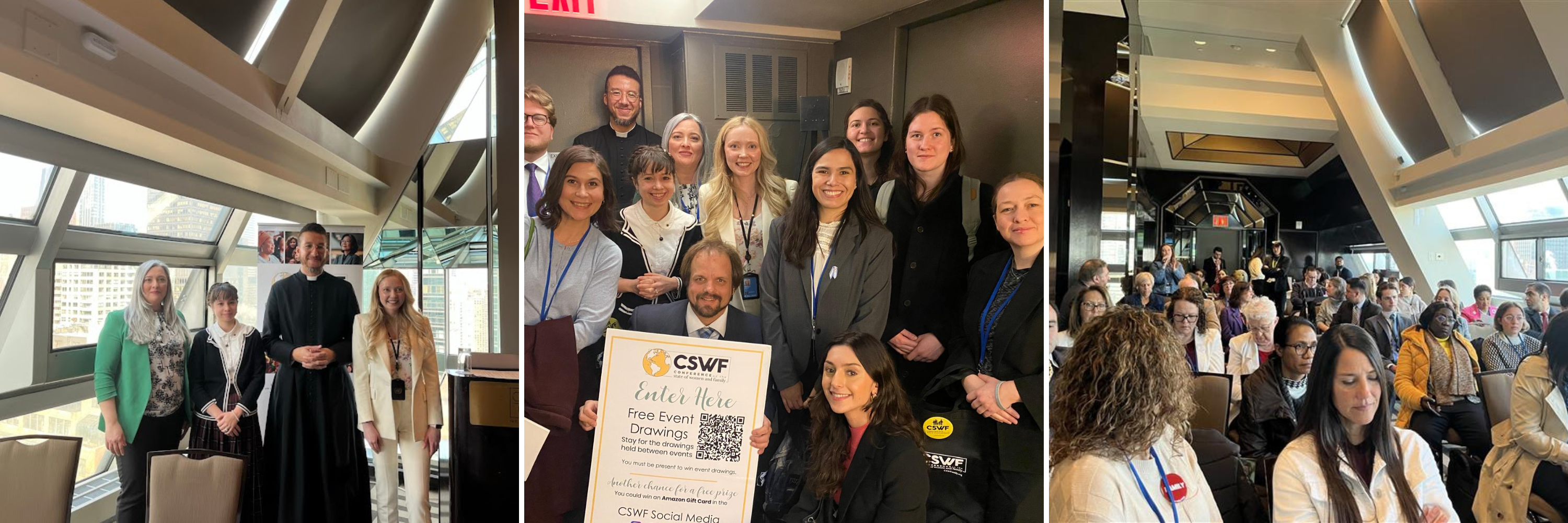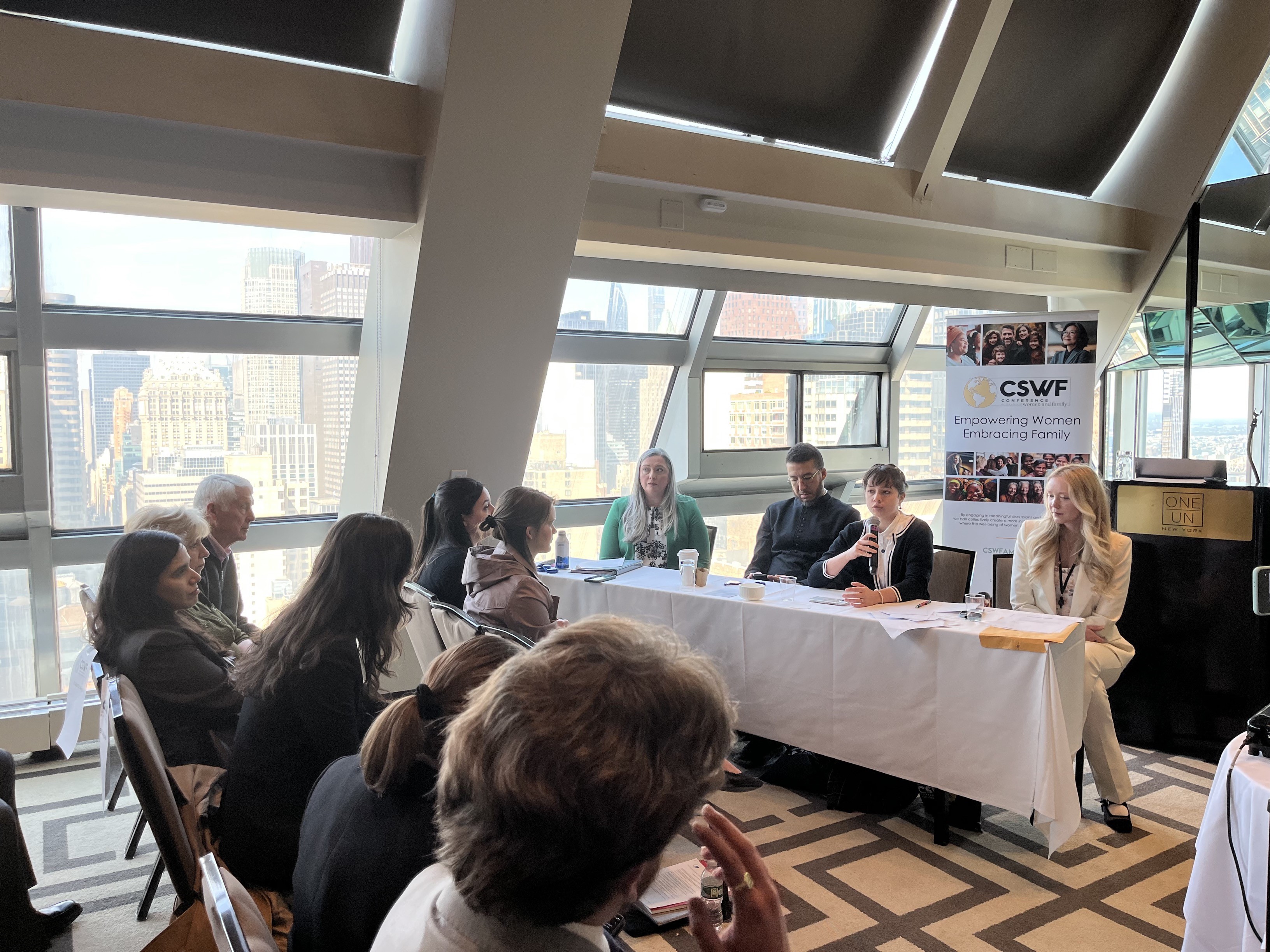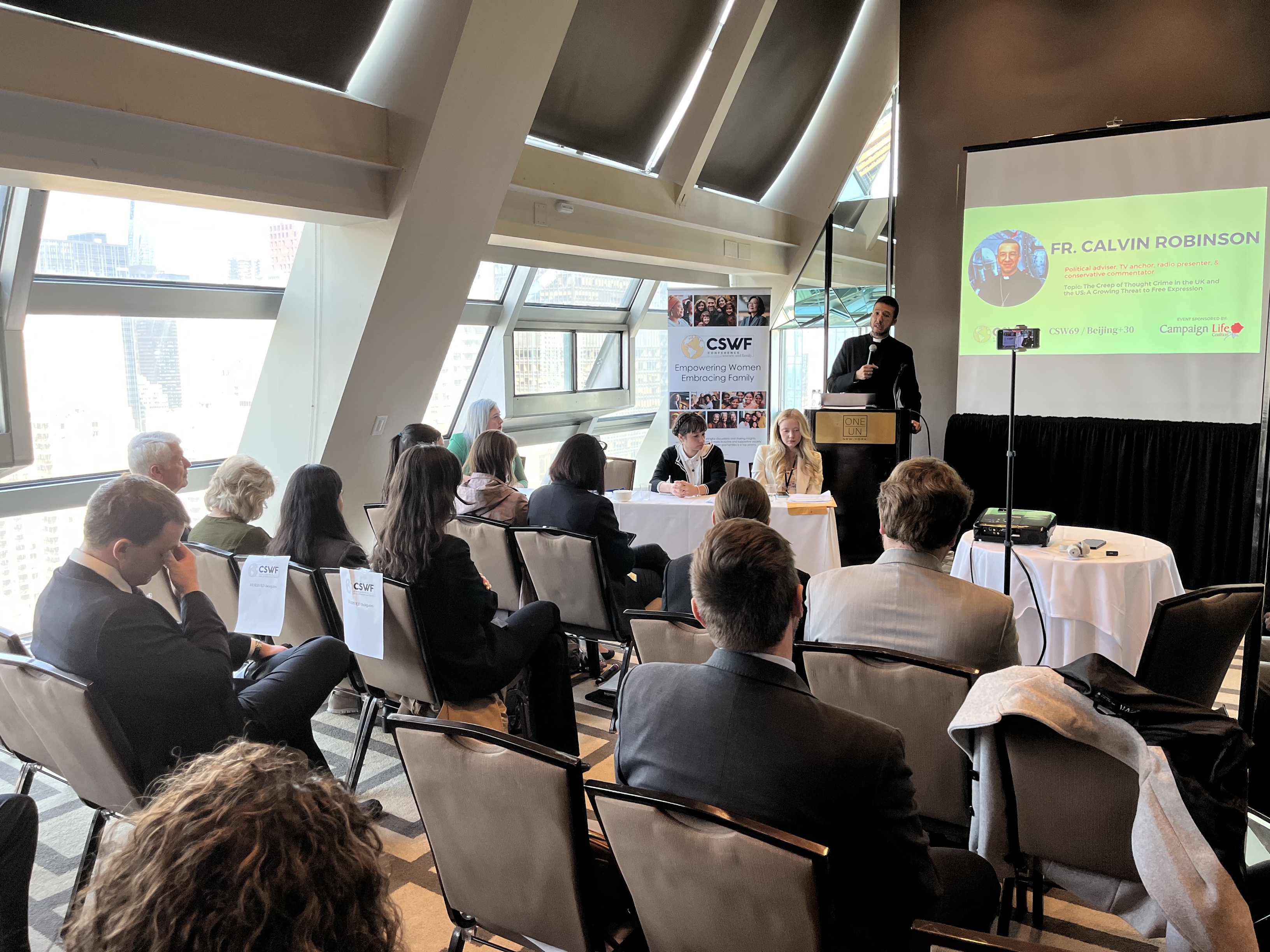Bringing the Debate on Abortion Bubble Zone Laws to the United Nations: Defending Free Speech and Human Rights

On the second, and final, day of the Conference on the State of Women and Family– a parallel conference organized by pro-life and pro-family NGOs during the UN Commission on the Status of Women, we continued to attend events that brought the sanctity of human life and the natural family to the forefront of discussion.
Yesterday, we had the opportunity to host our own event in this forum titled “Abortion Bubble Zones and Their Impact on Civil Rights, Women's Health, and Pre-Born Lives”, which brought together some of the most dedicated voices in the pro-life movement. This gathering shone a light on the increasing restrictions placed on pro-life advocacy, particularly the dangers posed by abortion bubble zones. The panelists speakers—Ruth Robert, Father Calvin Robinson, and Enza Rattenni— provided compelling testimonies, legal insights, and firsthand accounts of how these laws undermine fundamental freedoms and silence life-affirming voices.
The event was focused on abortion “bubble zones”, also known as “buffer zones”, which are areas surrounding abortion facilities where pro-life outreach, prayer, and advocacy are prohibited. While these laws claim to protect women from harassment, they instead criminalize peaceful pro-life activism and strip vulnerable women of the opportunity to receive life-affirming support.
Moderator Kim Headley of Campaign Life Coalition opened the session by emphasizing the importance of this discussion. "In challenging circumstances surrounding pregnancy, women often face immense pressure to choose abortion. Yet, with the right support and encouragement, many choose life and thrive."
Over the next 75 minutes, attendees heard from passionate advocates who detailed the harmful consequences of these laws and the broader cultural shift toward censoring pro-life speech.
Ruth Robert, Atlantic Region Coordinator for Campaign Life Coalition, gave a powerful account of how abortion bubble zones infringe on civil liberties. She described her own experience as a university student organizing a peaceful 40 Days for Life campaign outside a hospital that performed abortions. After complaints from pro-abortion activists, her efforts were quickly met with legislative action.

Ruth explained how bubble zone laws criminalize even the simplest forms of pro-life presence, such as wearing a pro-life t-shirt, holding a sign, or kneeling in silent prayer. She stated, "these laws use the excuse of ‘safety’ to suppress free speech and deny women access to information that could change their minds. If I were standing outside an abortion clinic wearing a pro-choice shirt, I wouldn’t be breaking any law. But because I wear a pro-life one, I can be arrested."
She also highlighted the hypocrisy of these laws, noting that the Canadian Criminal Code already prohibits harassment and intimidation. Bubble zones, therefore, do not address any real threats; instead, they silence one particular viewpoint.
Moreover, she warned that these restrictions would not stop with abortion advocacy. Citing examples from Canada, she pointed out that similar censorship laws have now been extended to limit protests against COVID-19 policies and even parental rights concerns regarding school curriculum.
Father Calvin Robinson, a well-known political commentator and clergyman from the UK, expanded on the theme of free speech suppression, detailing how similar laws have taken hold in Britain. He explained that in the UK, pro-life advocates are not only prohibited from speaking near abortion clinics but can also be arrested for silently praying.

One of the most shocking cases he shared was that of Isabel Vaughan-Spruce, a pro-life activist arrested for standing silently near an abortion clinic. When police asked if she was praying in her head, she answered truthfully—yes—and was taken into custody. "The moment we criminalize silent prayer," Father Robinson warned, "we have entered a new era of totalitarianism."
He also recounted the case of Adam Smith-Connor, who was found guilty of praying outside an abortion facility. The judge ruled that silent prayer could be interpreted as "disapproval of abortion," setting a chilling precedent for future restrictions on religious expression.
Father Robinson stressed that these laws are part of a broader effort to erase the idea that life begins at conception, sharing that “the state wants to play God. From abortion to euthanasia, they are deciding who lives and who dies. Our duty as Christians is to resist this evil with everything we have."
If there was any doubt that abortion bubble zones harm women, Enza Rattenni’s stories removed it. As a veteran sidewalk counselor and former director of Aid to Women and St. Joseph Centre of Hope for Women, she has spent years standing outside abortion clinics, offering support to women who feel trapped in crisis pregnancies.
Through powerful testimonies, she illustrated how sidewalk counseling has saved lives. She shared the story of Dakota, a young woman who walked into a pregnancy center by mistake, intending to get an abortion. With tears in her eyes, Dakota told Enza, "I don’t want to do this, but I can’t see a way out." Because of that encounter, Dakota’s baby was saved.

Another woman, Roxanna, had traveled from Nunavut for a late-term abortion at 23 weeks. She was determined to go through with the procedure, believing that her abusive partner and career aspirations left her no other option. Yet after speaking with Enza, she realized that abortion contradicted everything she valued. "Your culture has suffered so much," Enza told her. "The only way to revitalize it is by bringing new life into your community, not destroying it." Roxanna chose life, and her son was adopted by a local family, allowing her to continue her career.
Enza also spoke about Diana, a woman who underwent the first stage of a late-term abortion but desperately regretted it afterward. She searched for a sidewalk counselor but found none, due to the new bubble zone law. When she finally sought help, it was too late—her child had already been injected with a lethal drug. Enza held Diana’s stillborn daughter in her hands, overwhelmed by the loss. "She was looking for us on the sidewalk," Enza said. "But we weren’t there. The law kept us from helping her."
She ended with a call to action: "We must never stop fighting for these women. If we don’t stand outside those clinics, who will?"
As the event came to a close, the speakers emphasized that abortion is not a human right—life is. The pro-life movement must remain steadfast in exposing the truth, educating the next generation, and pushing back against laws that suppress free speech and harm women in crisis. Kim Headley concluded with a passionate reminder: "We must be the voices that speak for the voiceless. The government wants abortion to be the only option, but we will never stop providing women with real choices. We will never stop defending life."
The event left attendees inspired, determined, and ready to continue the fight for the most fundamental of all rights—the right to life.

